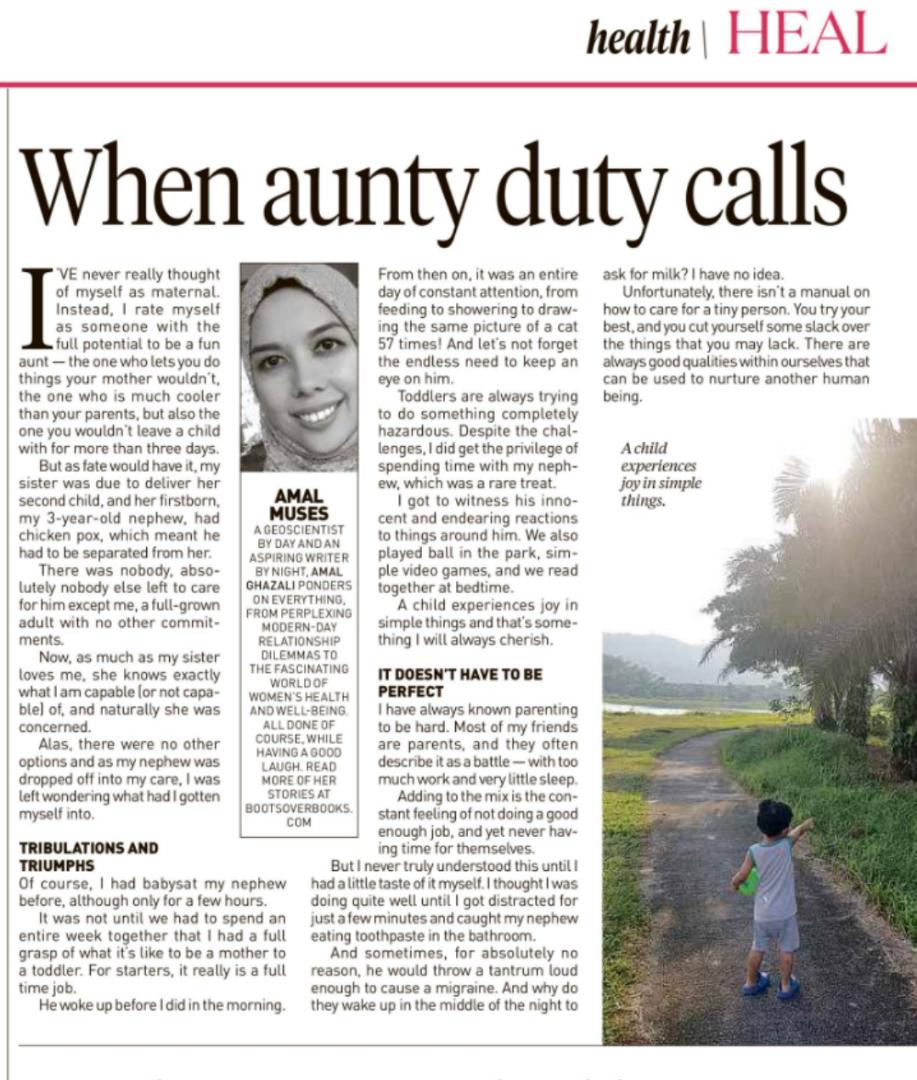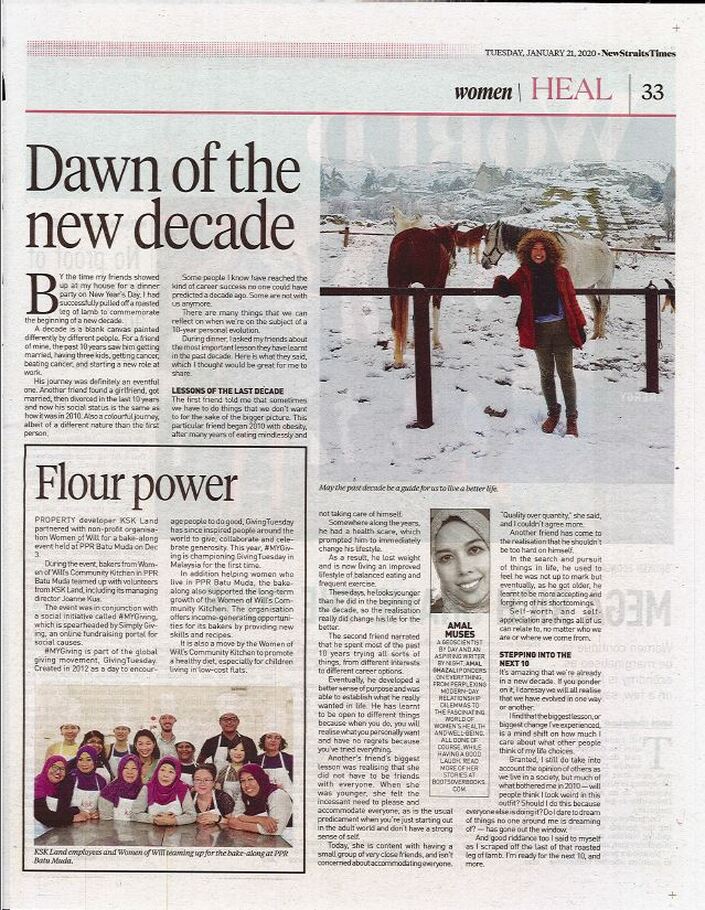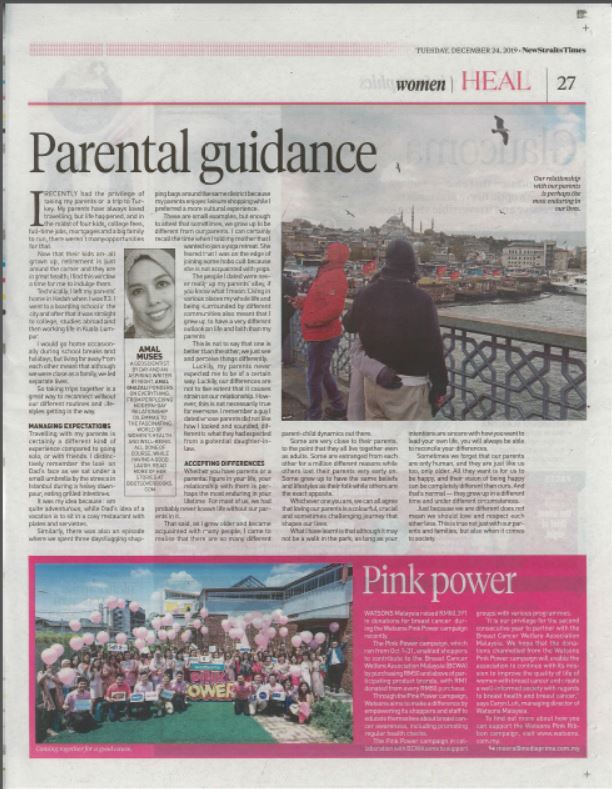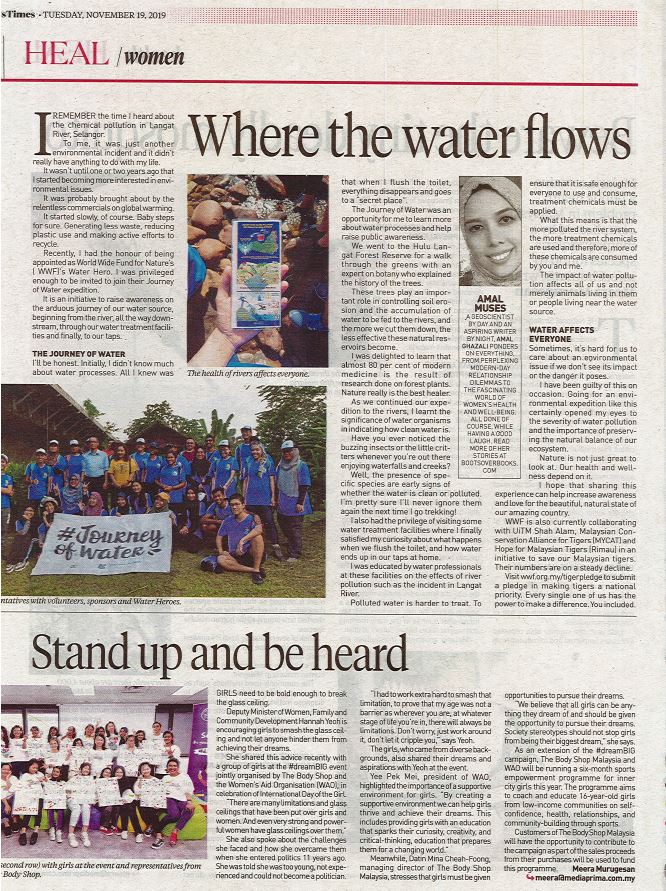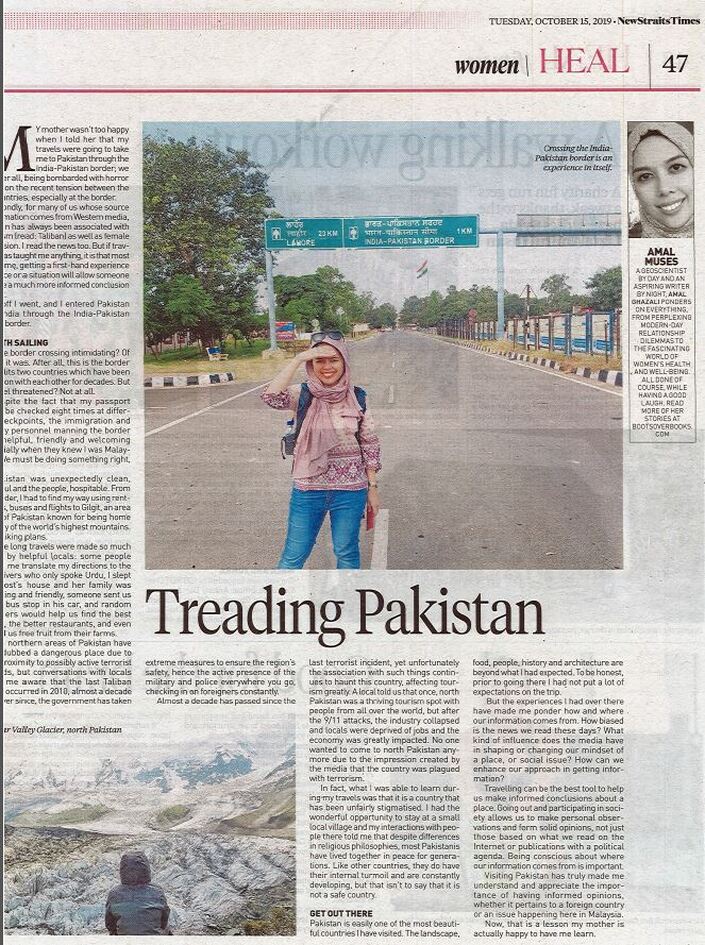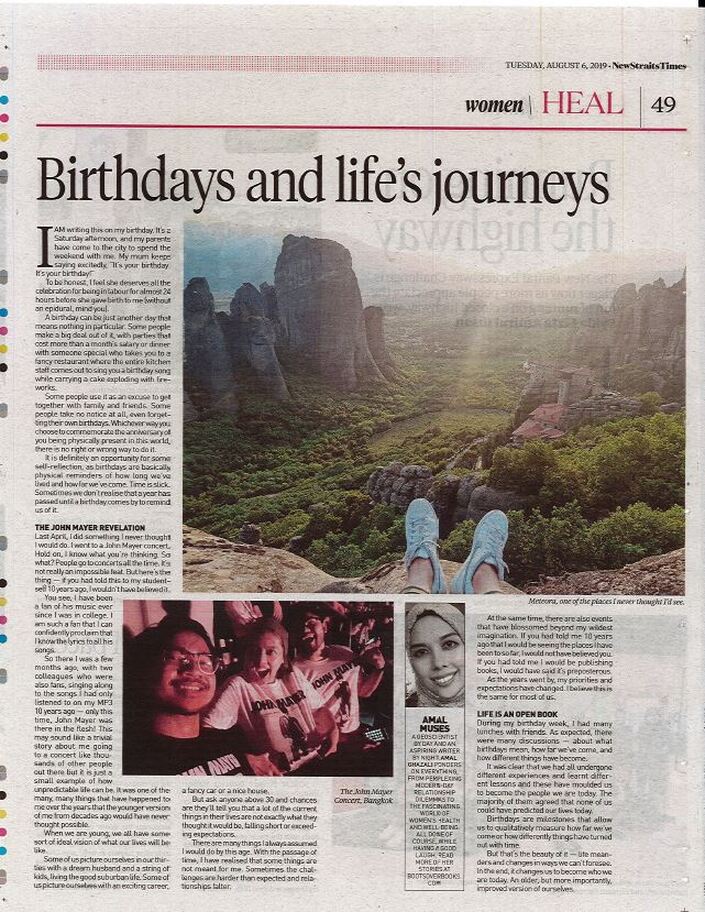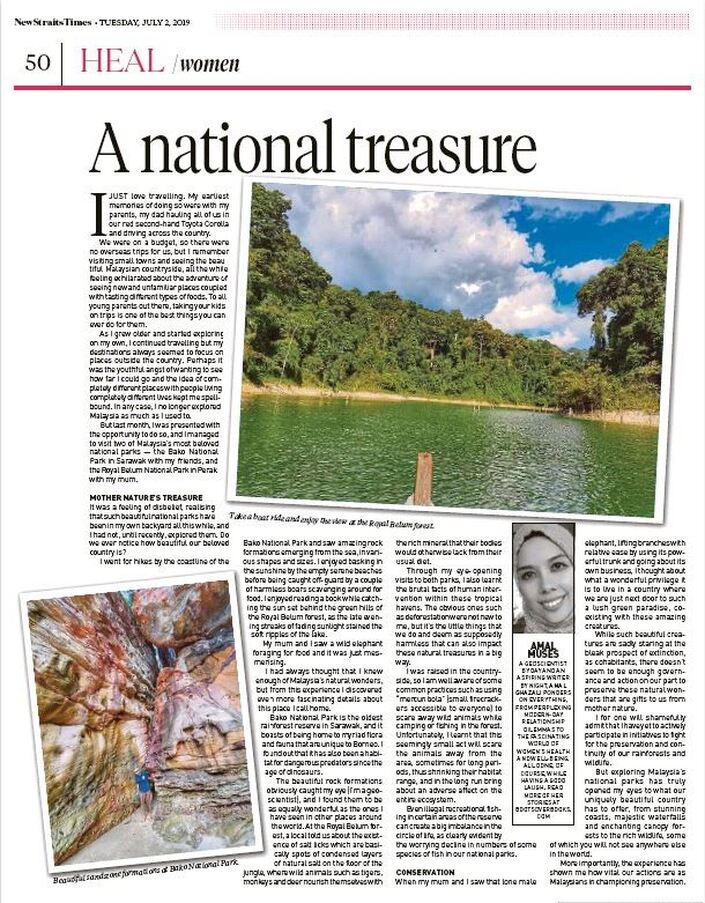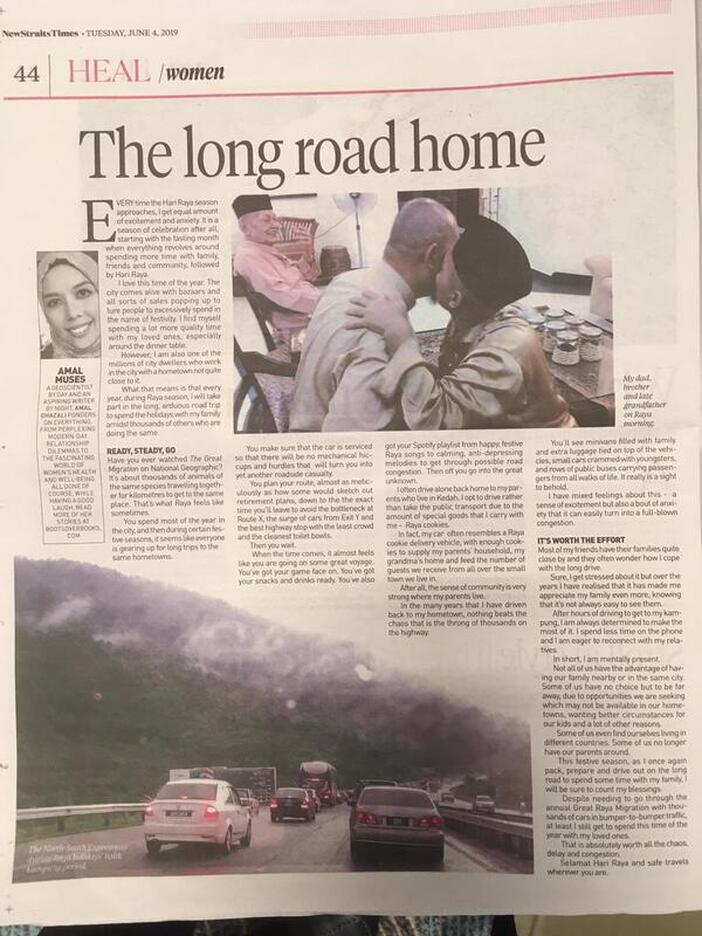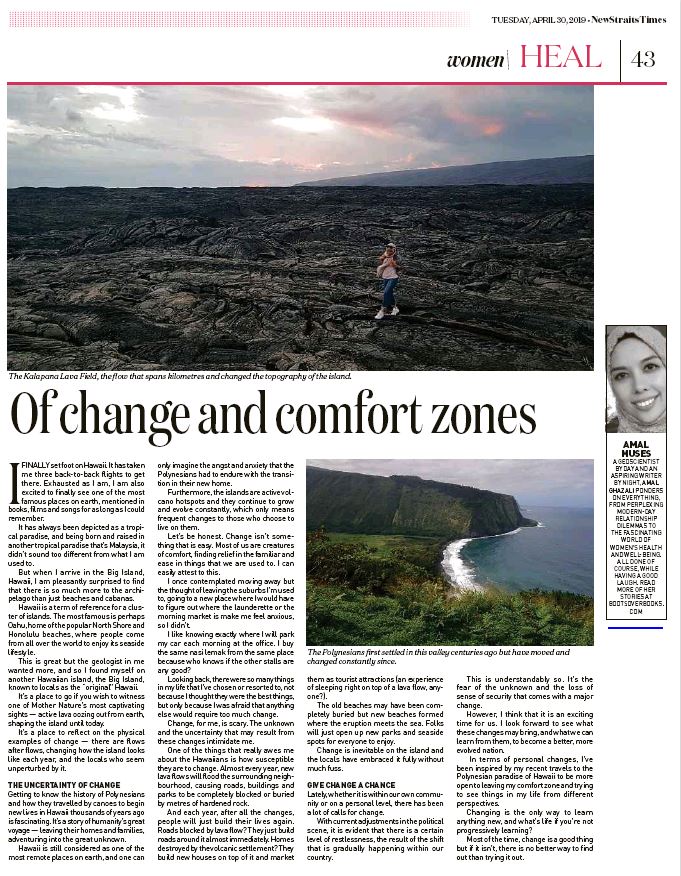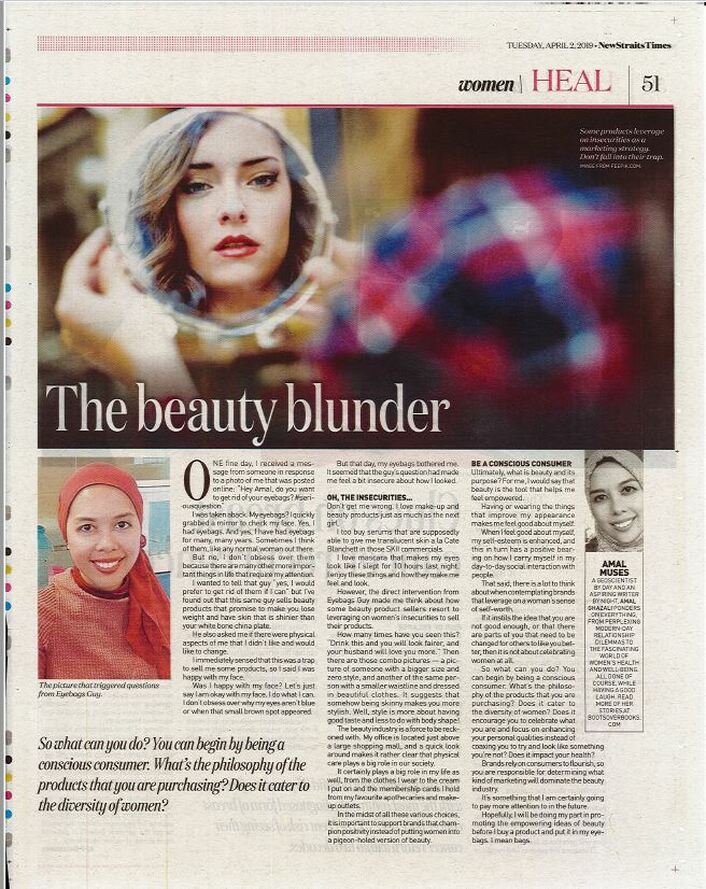|
Auntie Duties
By Amal Ghazali I’ve never really thought of myself as someone ‘maternal’. I define this term through the traditional context of someone raised in this society; someone who is maternal would be extremely attentive, feminine, generous with hugs, cuddles and nursery rhymes, with a natural instinct of exactly what to do when caring for an infant. I do not feel like I possess any of these skills at all. Instead, I rate myself as someone who has the full potential of being the ‘fun aunt’, the one who lets you do things your mother wouldn’t, the one who is much cooler than your parents, but also the one you wouldn’t leave alone with a child unattended for more than 3 days. But this was exactly what happened. As fate would have it, my sister was due to give birth to her second child, and her firstborn, my 3 year-old nephew, had chicken pox, which meant that he had to be separated from her for the duration of a typical quarantine for fear of the risk of transferring the virus to the newborn baby. The stars unaligned themselves, and there was nobody, absolutely nobody else left to care for him except for me, a full grown adult with no other commitments and hindrance. Now, as much as my sister loved me, she also knew exactly what I am capable (or not capable) of, and naturally she was concerned. Alas, there were no other options as it was all very last minute, and as he was dropped off in my care, I was left wondering what I had gotten myself into. The Tribulations and Triumphs Of course I had babysat my nephew before, although usually these occasions were only for a few hours. In these past experiences, a lot of ‘accidents’ had taken place, a further testament as to why I was not exactly the best person for the job. Once, when he was 1.5 years old, I gave him a steaming cup of hot chocolate when he was clearly not at the age suitable for cups yet. He ended up pouring all of it onto his face. There was the incident when I dropped him into a pool. I was also known to always forget to change him and he would toddle around for the entire day with a diaper so soggy it almost dropped to his knees. But it was not until we had to spend that entire week together that I had a full grasp of what it is like to be a mother to a toddler. For starters, it really is a full time job. He usually woke up before I did in the mornings. From then on, it is an entire day of constant attention, from feeding to showering to drawing the same picture of a cat for 57 times, and let’s not forget the endless need to keep an eye out in case they try something that might get themselves killed. And they are always trying to do something completely hazardous. Despite the challenges, I did get the privilege of spending time with my nephew, which is a rare treat. I got to see how innocent his perceptions were on things happening around him, we had a good time playing ball in the park every evening, I taught him how to play simple video games, and we read books together at bed time. A child’s joy is simple, and these are the things I’ll always cherish and remember. It Doesn’t Have To Be Perfect I had always known how hard parenting is. Most of my friends are parents, and they often describe it as a battle between too much work and not enough sleep. Adding to the mix is the constant feeling of not doing a good enough job, and yet never having time for themselves. But I suppose I never truly understood it until I had a little taste of the experience myself. I thought I was doing quite well until I got distracted for just a few minutes and caught my nephew eating toothpaste in the bathroom. Sometimes, for absolutely no reason, he would throw a tantrum loud enough to cause a migraine. Did you know that they wake up in the middle of the night to ask for milk? Why they couldn’t just wait until the morning, I have no idea. Like most things in life, I don’t think that there is a direct manual of how to care for a tiny person. You try your best, and you cut yourself some slack over the things that you may lack. There are always good qualities we have within ourselves that can be used to nurture another human being, and luckily in this day and age, there are plenty of aids to help us with them. I will always think of myself as a better candidate for ‘cool aunt’ rather than ‘very responsible parent’, but in either case, it is a splendid opportunity and wonderful responsibility to take part in directly helping to facilitate a brand new life, and contribute to shape the next generation. Dawn Of The New Decade
By Amal Ghazali By the time my friends showed up at my house for a dinner party on New Year’s Day, I had successfully pulled off my first big cook out of 2020 - a roasted leg of lamb, to commemorate the beginnings of a new decade. I’ve never roasted an entire leg of lamb before. But then again, I’ve never done a lot of things I had done for the past decade, so it’s safe to say that this year will hopefully continue to see the same exciting trend. A decade is a blank canvas painted differently by different people. For a friend of mine, the past ten years saw him getting married, getting 3 kids, getting cancer, beating cancer, and starting a new role at work. His journey was definitely an eventful one. Another friend spent the last 10 years finding a girlfriend, getting married, then getting divorced, and now his social status is exactly how he began in 2010. Also a colourful journey, albeit of a different nature than the first one. Some people I know have reached the kind of career success no one could have even predicted a decade ago. Some are not even here with us anymore. There are a lot of things that we can reflect on when we’re on the subject of a 10-year personal evolution. During our dinner, I asked all of my four friends who came by, the most important lesson they have learned in the past decade of their lives. Here is what they said, which I thought would be great for me to share. Lessons Of The Last Decade The first friend told us that the biggest lesson he has learned in the past 10 years is that sometimes, we have to do the things that we don’t want to do for the sake of a bigger picture. This particular friend began 2010 with obesity, after many years of eating mindlessly and not taking care of himself. Somewhere along the years, he had a health scare, which prompted him to immediately change his lifestyle for fear of his own life. As a result, he lost so much of his unhealthy weight and is now living an improved lifestyle of balanced eating and frequent exercise. These days, he looks younger than he ever did in the beginning of the decade, so it was clear that this realisation really did change his life for the better. The second friend narrated that he spent most of his past 10 years trying all sorts of things, from different interests to different career options. Eventually, he developed a better sense of purpose and was able to establish what he really wanted in his life, based on all of the things that he have dared to try and venture into. The biggest lesson he has learned was to be open to try different things so that when you do come to a point of knowing what you personally want, you can safely say that you have tried everything and have no regrets. The third friend’s biggest lesson was realising that she did not have to be friends with everyone. When she was much younger, she felt the incessant need to please and accommodate everyone, as is the usual predicament when you’re only starting up in the real adult world and don’t necessarily have a strong sense of self. Today, she is content with having a small group of very close friends, and isn’t too concerned with accommodating everyone anymore. “Quality over quantity,” she said, and I couldn’t agree more. The fourth friend emphasised on the revelations he has discovered over the past 10 years in terms of his relationship with himself. What he has learned was to not be too hard on himself. In the search and pursuit of things in life, he used to feel bad about himself or resorted to a feeling of not doing or being enough, but eventually as he got older he learned to be more accepting and forgiving of his own shortcomings. Self-worth and self-appreciation is certainly a subject all of us can relate to, no matter who are from whichever walk of life. Stepping Into The Next Ten It’s amazing to think that we’re at the precipice of a new decade already. If you really invest your time to ponder it over, I daresay that we’ll all realise that we have evolved in one way or another, no matter where life brought us to by the end of the last 10 years. I find that the biggest lesson, or the biggest change that I’ve experienced, is shifting my mindset on how much I care about what other people think of my life choices. Granted, I still do consider other people’s opinions up to this day, as we live in a society after all. However, much of what bothered me in 2010 - will people think I look weird in this outfit? Should I do this because everyone is doing it? Do I dare to dream of things that no one around me is really dreaming of? - has gone out the window, disappearing with much of my adolescent naivety. And good riddance, I say to myself as I was scraping off the last of that roasted leg of lamb. I’m ready for the next 10, and more. Parental Guidance
By Amal Ghazali This month I had the privilege of taking my parents on a trip to Turkey. My parents have always loved travelling, but life happened, and in the midst of four kids, college fees, full time jobs, mortgages and a big family to run, there weren’t a lot of opportunities for that. These days their kids are all grown, retirement is just around the corner and they are in great health, and I understood this to be a window for me to indulge them. Technically, I left my parents’ home in Kedah when I was 13. I enrolled into a boarding school in KL, and after that it was straight away to college, studying abroad and beginning a working life in the big city. I would go home occasionally for school breaks and holidays, but living far away from each other meant that although we are close as family, we do, in a way, lead separate lives. Taking trips together is a great way for us to reconnect and bond without our different routines and lifestyles being in the way. Managing Expectations Travelling with my parents is certainly a different kind of experience compared to travelling solo, with friends or with a spouse. I distinctively remember the look on my Dad’s face as we sat under a small umbrella by the streets in Istanbul during a heavy downpour while eating a plate of grilled intestines. It was my idea because I have always been quite adventurous, while my Dad’s idea of a vacation is to sit in a cosy restaurant with plates of proper food and soviets. Similarly, there was also an episode where we spent three days lugging around shopping bags around the same district because my parents enjoyed leisure shopping while I preferred a more cultural experience. These are small examples, but enough to attest that sometimes, we grow up to become somewhat different than our parents. I can certainly recall the times when I told my mother that I wanted to join a yoga retreat, and she feared that I was on the edge of joining some hobo cult, as she had never been acquainted with yoga before. The people I dated were never really “up my parents’ alley”, if you know what I mean. Living in various places my whole life and being surrounded with different communities than my parents are used to also meant that I grew up to have a very different outlook in life and faith than them, although this is not to say that one is better than the other - we just see and perceive things differently. Luckily, my parents are the kind who never imposed me to become a certain way. Luckily, our differences are not to the extent that the cause strains in our relationship. However, this is not necessarily true for everyone. I remember a guy I was seeing whose parents did not like that I looked and sounded different than what they had expected from a possible in-law. Sometimes, managing differences within a family can cause a giant rift, and even more unfortunately, a life controlled by fulfilling other people’s expectations of us. In this side of the world where family, culture and heritage is the root of society, sensitivities and expectations sometimes become the controlling factor of our relationships with our loved ones. Accepting Differences Whether you have parents, or any other sort of parental figure in your life, your relationship with them is perhaps the most enduring one in your entire lifetime. For most of us, we had probably never known a life without our parents in it. That being said, as I grew older and became acquainted with many other people, I came to realise that there are so many different parent-child dynamics out there. Some are very close to their parents to the point that they live together even as adults, some are estranged from each other for a million different reasons, some lost their parents very early on in their age, some grew up to have exactly the same beliefs and lifestyles as their folks, and some came to have a completely different lifestyle than how they were raised. Whichever one you are, I think we can all agree that loving our parents is a colourful, crucial and sometimes challenging journey that shapes the totality of our lives. As for me, what I have learned through my own experiences is that although it may not be a walk in the park, as long as your intentions are sincere with how you want to lead your own life, you will always be able to, in one way or another, reconcile your differences together. Sometimes we forget that our parents are only human, and they are just like us too, only older. All they want is for us to be happy, and their vision of being ‘happy’ can sometimes be completely different than ours. And that’s normal, as they grew up in a different time and circumstance than we did. Just because we are different does not mean we should love and respect each other any less. This is true not with just our parents and families, but also when it comes to the bigger picture of society. Where The Water Flows
By Amal Ghazali I remember the time when I heard the news about the chemical pollution of Langat River, Selangor. “Oh, that’s so unfortunate,” I said, feeling sympathetic for about one minute and thirty seconds, until an email alert about a shopping sale came up and I forgot all about it. I never really bothered to keep up on its following events again. For me it sounded like just another environmental incident somewhere far away, and didn’t really have anything to do with my life. It wasn’t until one or two years ago that I started becoming more interested in environmental issues. It was probably brought on by the relentless commercials on global warming (so I guess commercials can be good sometimes!), and the increase of social media talks around this subject that got me intrigued to want to learn more about them and how I could play a part in making a positive impact. It started slowly, of course, with the baby steps of making less waste, and eventually grew into reducing plastic use and making active efforts to recycle. Three weeks ago, I had the honour of being appointed as World Wild Fund’s (or more popularly known as WWF) ‘Water Hero’, and I was privileged enough to be invited to join their ‘Journey Of Water’ expedition. The Journey Of Water is basically an initiative to raise awareness on the arduous journey of our water source, beginning from the feeding of the river all the way to downstream, through our water treatment facilities and finally to the taps of our homes. The Journey Of Water Alright, I’ll be honest. I didn’t know much about water processes in the first place. All I knew was that when I flush the toilet, they all disappear and go to a ‘secret place’. On days when the water pressure is low at my house, I’d join the Twitter-verse on the rant of why we seem to have water shortage issues despite living in a tropical country where it rains all the time. I’ve had my moments of curiosity about the processes of water, and the Journey Of Water was an opportunity for me to learn more and help raise public awareness for it. The thing that struck me the most about the entire experience was learning how our country’s ecosystem is just one huge perfect balance of water cycle. That is, of course, until human civilisation came into the picture with the unfortunate side effects of logging, deforestation, pollution and excessive waste production. We went to Hulu Langat Forest Reserve for a walk through the greens with a botanic expert who explained the history of the trees and how the Early Malaysia began logging activities as part of the growing economy in exporting high quality wood and amber. These trees play and important role in controlling soil erosion and the accumulation of water to be fed to the rivers, and the more we cut them down, the less effective these natural reservoirs become. I was also delighted to learn that almost 80% of modern medicine is derived from research done on forest plants - in a way, nature really is the best healer. As we continued our expedition to the rivers, I was able to learn the significance of water organisms in indicating how clean the water really is. I was in awe of the academicians and scientific professors who were there and showed me how much work they have done in analysing water and its quality surrounding our communities. Did you ever notice the buzzing insects or the little critters whenever you’re out there enjoying the waterfalls and creeks? The presence of specific species are early signs of whether the water is clean or polluted, and I’m pretty sure I’ll never ignore them again the next time I go trekking. I also had the privilege to visit some water treatment facilities, where I finally fed my curiosity about what happens when we flush the toilet, and how water ends up at our taps at home. I was educated by the water professionals at these facilities about the effects of river pollution such as the incident in Langat River not too long ago. Polluted water is harder to treat, and to ensure that it is safe enough for everyone to use and consume, treatment chemicals must be applied to them. What this means is that the more polluted the river system, the more treatment chemicals are used, and therefore more of these chemical are consumed by you and I. The impact of water pollution affects all of us, and not just merely animals living in them or people living near the water source. Water Affects Everyone Sometimes, it’s harder for us to care much about an environmental issue if we don’t directly see its impact on us or the real danger it poses. I am also guilty of this on some occasions. However, going for an environmental expedition like the this had certainly opened my eyes to the severity of water pollution and the importance of preserving the natural balance of our ecosystem. It’s not just because nature is great to look at. It’s also because our health and wellness depend on it. I am hoping that my sharing of this experience can help increase our awareness and love for the beautiful natural state of our amazing country. At the same time, I am so appreciative of the opportunity to be introduced to the many local NGOs who work tirelessly to educate the public on important environmental issues surrounding us. WWF is also currently collaborating with UiTM Shah Alam, MYCAT (Malaysian Conservation Alliance for Tigers) and RIMAU (Hope for Malaysian Tigers) in an initiative to urge the prioritization of preserving Malaysian tigers, whose numbers are on a steady decline. Please visit wwf.org.my/tigerpledge to submit your plegde in making tigers a national priority. Every single one of us have the power to make a difference, so why not you? Treading Pakistan
By Amal Ghazali My mother wasn’t too happy when I told her that this time around, my travels were going to take me to Pakistan through the India-Pakistan border. First of all, the news have been bombarding us with horror stories about the recent tension between these two countries, especially around the border regions. Secondly, for many of us whose main media is derived from the West, Pakistan has always been associated with the sentiments of terrorism (read: Talibans) as well as female oppression. I read the news too. But if travelling has taught me anything, it is that most of the time, getting a first-hand experience of a place or a situation will allow someone to make a much more informed conclusion about it as compared to just reading about it from a biased point of view. So off I went, and I entered Pakistan from India through the India-Pakistan Wagah border. Smooth Sailing Was the border crossing process intimidating? Of course it was. After all, this is the border that splits two countries who have been in crisis with each other for decades. But did I feel threatened? Not at all. Despite the fact that my passport had to be checked 8 times at different check points, the immigration and military guys manning the border were helpful, friendly and welcoming (especially when they knew I was a Malaysian. We must be doing something right, guys!). Pakistan was unexpectedly clean, beautiful and hospitable. From the border, I had to find my way through rented cars, buses and flights to get to Gilgit, an area north of Pakistan known for being a home to many of the world’s highest mountains, as I had hiking plans there. The long travels were made so much better by the helpful locals - some people helped me translate my directions to the taxi guys who only spoke Urdu, I slept over a host’s house and her family was charming and friendly, someone sent us to the bus stop with his car, and random strangers would help us find the best routes, the better restaurants, and even offered us free fruits from their farms. As I explored Pakistan, I was on high alert to see the possible consistency between what I’ve heard from the media I was exposed to versus observations I could make on my own from the time I actually spent there. The northern areas of Pakistan have been notoriously dubbed as a dangerous place to be due to its close proximity to possible active terrorist grounds, but conversations with locals informed me that the last Taliban attack occurred in 2010, almost a decade ago. Ever since, the government has taken extreme measures in ensuring the region’s safety, hence the active presence of the military and police everywhere you go, checking in on foreigners constantly. Almost a decade has passed since the last terrorist intervention, yet unfortunately the generalization of being associated with such things continue to haunt this country, affecting tourism greatly. A local told us that once, north Pakistan was a thriving tourism spot with people from all over the world, but after the 9/11 attacks the whole industry collapsed and locals were deprived of jobs and the economy was greatly impacted. No one wanted to come to north Pakistan anymore due to the impressions painted by the media that the country was plagued with terrorism. In fact, what I was able to learn from observation during my travels was that perhaps it is a country that has been unfairly stigmatised. I had the wonderful opportunity to stay at a small local village where people were in the midst of celebrating Ashura (a celebration mostly associated with the Shi’ite sect of Islam), and interactions told me that despite differences in religious philosophies, most Pakistanis have lived together in peace for generations. Like other countries they do have their internal turmoil and are constantly developing, but that isn’t to say that it is not at all a safe country to be in. Get Out There Pakistan was easily one of the most beautiful countries I have been to in my life. The landscape, the food, the people, the history and the architecture were all beyond what I had expected of it. To be honest, through my research prior to going there I had not put a lot of expectations on it - the media has managed to persuade me of this. But this experience had made me ponder on how and from where our information comes from. How biased are the news we read these days? What kind of influence can media play in shaping or changing our mindset on a place, or a social issue? How can we enhance our approach on getting information? Travelling can be the best tool in helping us make informed conclusions about a place. Going out there, participating with the society allows us to make personal observations and solid opinions, not just based merely on stuff we read on the internet or publications doused with political agenda. Being conscious about the platform and where our information comes from is also equally important. Visiting Pakistan had truly made me understand and appreciate the importance of having informed opinions, whether it pertains a different place or an issue happening right here in our home, Malaysia. Now that is a lesson my mother is actually happy to have me learn. Change Of Plans
By Amal Ghazali I am writing this on my birthday. It’s a Saturday afternoon, and my parents had come by to the city to spend the weekend with me. My Mom kept saying, “It’s your birthday! It’s your birthday!” in the most excited manner, when to be honest I felt like it was her who deserves all the celebration for being in labour for almost 24 hours before she gave birth to me (without an epidural, mind you). A birthday can be just another day that means nothing in particular. Some people make a big deal out of it, with parties that cost more than your month’s salary or a special dinner with a special someone who takes you to a fancy restaurant where the whole kitchen staff comes out to sing you a birthday song while carrying a cake exploding with fireworks. Some people use it as an excuse to get together with family and friends. Some people take no notice at all, even forgetting their own birthdays. Whichever way you choose to commemorate the anniversary of you being physically present in this world, there is no right or wrong way to do it. However, it is definitely an opportunity for some self-reflection, as birthdays are basically physical reminders of how long we’ve lived and how far we’ve come. Time is slick - sometimes we don’t realise that a year has passed until a birthday comes by to remind us so. The John Mayer Revelation Last April I did something I never thought I would ever do. I went to a John Mayer concert. Hold on, I know what you’re thinking. So what? People go to concerts all the time. It’s not really an impossible feat. But here’s the thing – if you had told this to my student-self from 10 years ago, I wouldn’t have believed it. You see, I had been a fan of his music ever since I was in college. I am such a fan that I can confidently proclaim that I know all of the lyrics to all of his songs. Unfortunately, the same can’t be said about any of my friends. John Mayer was dubbed as ‘old people music’, he had never done an Asian tour and none of my friends would ever want to go and see him play live with me. And so the idea of ever going to one of his concerts seemed impossible and ludicrous. But there I was a few months ago, with 2 other colleagues who happened to also enjoy his music, singing along to the songs I had only listened to on my MP3 10 years ago, but this time John Mayer was there. In the flesh. This may sound like a trivial story about me going to a concert like thousands of other people out there, but it is just a small example of how unpredictable life can get. It is one of the many, many other things that have happened to me over the years that the younger version of me from decades ago would ever thought possible. When we were much younger, we all have some sort of ideal vision of what we would like our lives to be. Some of us pictured ourselves in our thirties with a dream husband and a string of kids, living the good suburban life. Some of us pictured ourselves with a raving career and a fancy car or a nice house. Some of us visualised ourselves as having a great, stable, easy going life in general. But ask anyone above the age 30 and chances are they’ll tell you that a lot of the current things in their lives are not exactly what they thought it would be. Some of the things that unravel are sub-par than their initial plans, while others may have exceeded expectations. As for me, there were many things I had always assumed I would do by this age, but with time they have revealed themselves as things that were not meant for me. It turns out that sometimes the plot thickens and the challenges are harder than expected, where you lose people, break relationships, fail in certain things or lose aspects of your health. At the same time, there were also events that blossomed beyond my wildest imagination. If you had told me 10 years ago that I would be seeing the places I have been to so far, I probably would have called your bluff. If you had told me I would be publishing books, I would have said it’s preposterous. In fact, if the twenty year-old me had met myself now, perhaps she wouldn’t have believed it. As the years went by my priorities and expectations have changed, and I believe that this is the same for the most of us. Life Is An Open Book During my birthday week I had lots of lunches with lots of friends. What this meant was that there were also a lot of discussions – about what birthdays mean, how far we’ve come, and how different things have become. It was clear that we all had different experiences and different lessons to learn, each of us being moulded to become specific people that we are today. Almost all of my friends would agree that in the end, none of them could’ve predicted their lives exactly as what they look like today. Birthdays are milestones that allow us to qualitatively measure how far we’ve come or how different things have turned out with time. But that’s the beauty of it all. It meanders and changes in ways that we can’t foresee, but in the end it always works out well in our favour, at the very least, to change us to become who we are today. An older, but more importantly, improved version of ourselves. The National Treasure
By Amal Ghazali I absolutely adore travelling. My earliest memories of it were with my parents, my Dad hauling us all in our red, second-hand Toyota Corolla, and we would drive somewhere across the country. We were strapped for budget, so there were no overseas trips for us, but I remember visiting small towns and the beautiful Malaysian countryside and feeling exhilarated with the idea that it was such an adventure, to see unfamiliar places and trying different food and seeing different views. To all young parents out there, taking your kids out for adventures with you will be one of the best things you could ever do for them. As I grew older and started exploring on my own, I continued travelling but my destinations always seemed to focus on places outside of the country. Perhaps it’s the youthful angst of wanting to see how far I could go, or perhaps it’s the idea of a completely different place with people living completely different lives that spell bounded me. In any case, I no longer explored Malaysia as much as I used to. But last month I was presented with the opportunity to do so, and I managed to visit two of Malaysia’s most beloved national parks - the Bako National Park in Sarawak with my friends, and the Royal Belum National Park in Perak with my Mom. Mother Nature’s Treasure It was one of those feelings of disbelief, realising that these beautiful natural reserves have been in my own backyard all these while, and I had not, until now, uncovered it. Do we even notice how beautiful this country is? I went for hikes by the coastlines of Bako National Park and saw amazing rock formations emerging from the blue sea, in all shapes and sizes. I enjoyed some sunshine by the empty serene beaches before getting jumped by a couple of harmless boars scavenging around for breakfast. I read a book while watching the sun set behind the green hills of Royal Belum forest, its late evening orange streaks staining the soft ripples of the lake. My Mom and I saw a wild elephant foraging for food and it was magnificent. I’ve always thought that I knew enough about the country’s natural wonders, but through these experiences I discovered even more fascinating information about this place I call home. Bako National Park is the oldest rainforest reserve in Sarawak, and it contains almost all types of plant life the Borneo Island has to offer. I found out that it was also a habitat for salt water crocodiles, something that I never even knew Malaysia has. The beautiful rock formations obviously caught my eyes (I’m a geoscientist), and I found them to be equally as wonderful as the ones I would see in other places around the world. At Royal Belum forest, a local told us about the existence of salt licks - they are basically spots around the jungle with condensed layers of natural salt on the floor of the jungle, of which wild animals such as tigers, monkeys and deer would visit to lick the salt in order to nourish themselves with the minerals that their bodies would otherwise lack from their usual diet. Who knew? However, through my amazing visits to both national parks, I also came to learn about some hard facts of human interventions within these tropical havens. The obvious ones such as deforestation was not completely new to me, but it was how the little things that we do and deem harmless can impact these natural treasures in a big way. I was raised in the countryside so I was well aware of some common practices such as using ‘mercun bola’ (small firecrackers accessible to everyone) to scare away wild animals while you’re camping or fishing in the forest area. Unfortunately, I learned that this seemingly small act will scare the animals away from the area, sometimes for long periods of time, hindering them space for their habitat, and in the long run will affect the entire ecosystem. Even illegal recreational fishing in certain areas of the reserve could create a big imbalance in the circle of life there, as evidenced by the fast declining rates of some species of fish in our national parks. Preserving Our Natural Wonders When my Mom and I saw that lone male elephant, lifting branches with its trunk and minding its own business, I thought about what a wonderful privilege it is, to live in a country where we are living just next door to a lush green paradise, coexisting with these amazing creatures. They are on the fast track to extinction, and yet as cohabitants, there seem to be not aggressive enough governance and actions from us to preserve these natural wonders that are gifted to us. I, for one, will shamefully admit that I am yet to actively participate in initiatives to ensure the longevity of our rainforests and wildlife. But exploring Malaysia’s national parks has truly opened my eyes to what this country has to offer, from beautiful coasts, majestic waterfalls, enchanting canopy forests to the kaleidoscope of wildlife, some of which you can never see anywhere else in the world. More importantly, the experience has shown me how vital our actions are as Malaysians in ensuring their preservations, not just through small, environmentally-friendly acts, but also in large-scale, long-term laws to induce a more significant impact in making sure this country continues to be a home for our extensive and wonderful ecosystem. On The Road Again
By Amal Ghazali Everytime the Raya season approaches, I get equal amounts of excitement and anxiety. It is a season of celebrations, after all, starting with the fasting month where everything centers around spending more time with family, friends or community, followed by Raya which may or may not last around the same duration (the age-old saying that ‘Raya is a month long’). I love this time of the year. The city comes alive with bazaars and all sorts of sales popping up to lure people to excessively spend in the spirit of festivities, and I find myself spending a lot more quality time with my loved ones, especially around the dinner table. However, I am also one of the thousands of others who work in the big city with a hometown not quite close to it. What that means is that every year, during the Raya season, I will take part in the long, arduous business of traveling long distance to spend the holidays with my family amidst thousands of others who are in the same predicament. Ready, Steady, Go Have you ever seen The Great Migration on National Geographic? It’s about thousands of animals of the same species all traveling together for miles to get to the same exact place. That’s what it feels like sometimes. You spend most of the year in the city, and then during certain festive seasons it seems like everyone is gearing up for a voyage to the same hometowns. You make sure that the car is serviced, so that there will be no mechanical hiccups and hurdles that would turn you into yet another roadside casualty that you often see on your long drive back to your kampung. You plan your route, almost as meticulous as how you would sketch out your retirement plans, down to the details of exactly what time you’ll leave in order to avoid the bottlenecking at Route X, the surge of cars coming in from Exit Y, and the best RnR with the least crowd and the best state of toilet bowls. And then you wait. When the time comes, it almost feels like you are going into some kind of great voyage. You’ve got your game face on, you’ve got your snacks and drinks ready, and you’ve got your Spotify playlist in the order from happy, festive Raya songs to calming, anti-depressing melodies to get through possible long road congestion. And then off you go into the great unknown. For me, I would often be driving alone back home to my parents who live in Kedah, and I would opt to drive rather than take the public transport due to the immense number of special goods that I carry with me - the Raya cookies. In fact, my car would often resemble a Raya cookie delivery vehicle, with enough cookies to supply my parents’ household, my grandma’s home, and to sustain the number of guests we would receive from all over the small town we live in, as the sense of community is very strong where my parents live. In the many years that I have driven back to my hometown, I can assure you that nothing beats the chaos that is joining the throngs of thousands on the highway, with people also going back home to see their own loved ones. You’ll see minivans filled with family and extra luggage tied on top of the vehicles, small cars crammed with youngsters making a carpool out of it, and rows upon rows of public buses carrying so many passengers from all walks of life. It really is quite a sight to behold. I have mixed feelings about this - a sense of excitement seeing so many others all geared up to get together with the people that matter to them, but also a bout of anxiety that at any given time, this could easily turn into a full blown traffic congestion. It’s Worth The Travel Most of my friends have their families quite close by, and often wonder how I cope with driving home for hours at least once a month, and even more so, during the holiday seasons when the North-South highway traffic is notorious for being delayed and congested. Sure I get stressed about it too sometimes, but over the years I have realised that it has made me appreciate my family even more, knowing that it’s not always easy to see them. After hours of driving to get to my kampung, I am always determined to make the most out of it - that means I spend less time on the phone, I am eager to reconnect with my relatives who live in other parts of the country and would only get together this time of the year, and I am more mentally present. Not all of us have the advantage of having our family live just around the corner or even in the same city. Some of us have no choice but to be far away, due to opportunities we are seeking which may not be available in our hometowns, wanting better circumstances for our kids and a lot of other reasons. Some of us even find ourselves living in different countries than our loved ones. Some of us no longer have our parents around at all. This festive season, as I once again pack, prepare and drive out onto the long road to spend some time with my family, I would be sure to count my blessings that despite needing to go through the annual ‘Great Raya Migration’ with thousands of cars and bumper-to-bumper traffic, at least I still get to spend this time of the year with my family. I still have a family to drive back to. And sometimes, that is absolutely worth all the chaos, delays and congestion any highway traffic can give you. Selamat Hari Raya, and safe travels wherever you are. Of Change And Comfort Zones
By Amal Ghazali I finally set foot on Hawaii. It took me three back-to-back flights to get there, but exhausted as I was, I was also excited to finally see for myself one of the most famous places on earth, mentioned in books, films and songs for as long as I could remember. It has always been depicted as a tropical paradise, and being born and raised in another tropical paradise that is Malaysia, it didn’t sound too different than what I am used to. But when I arrived in the Big Island, Hawaii, I was pleasantly surprised to find that there were so much more to the archipelago than just beaches and cabanas. Hawaii, in actuality, is a term of reference to a cluster of islands. The most famous one is perhaps Oahu, home of the popular North Shore and Honolulu beaches where people come from all over the world and all walks of life to enjoy the seaside lifestyle. This is great, but the geologist in me wanted more, and so I found myself on another Hawaiian island, the Big Island, known to locals as the ‘original’ Hawai’i. It’s a place to go if you wish to witness one of Mother Nature’s most captivating sights – active lava flows oozing out from earth and still shaping the island up to today. As an added bonus, it’s also a place to reflect on the physical examples of change – there were lava flows after lava flows, adjusting how the island looks like each year, and the locals who seem unperturbed by it. The Uncertainty Of Change Getting to know the history of Polynesians and how they travelled by canoes to begin new lives in Hawaii thousands of years ago was fascinating. It’s a story of humanity’s great voyage – leaving their homes and families and adventuring into the great unknown. Hawaii is still considered as one of the most remote places on earth, and one could only imagine the great deal of angst and anxiety the Polynesians would have to endure with the transitions in their new home. Furthermore, the islands were active volcano hotspots and continued to grow and evolve constantly, which only meant more frequent changes to those who chose to live on them. Let’s be honest. Change isn’t something that is easy to do. Most of us are creatures of comfort, finding relief in the familiar and ease in things that we are used to. I can easily observe this from my own lifestyle. I once contemplated moving away, but the thought of leaving the suburbs I’m so used to, into a brand new place where I would have to figure out where the Laundrymat or the new morning market is makes me feel anxious, so I don’t. I like knowing exactly where I would park my car each morning at the office. I buy the same nasi lemak from the same place, because who knows if the other stalls are any good? Looking back, there were so many things in my life that I’ve chosen or resorted to, not because I thought they were the best things, but only because I was afraid that anything else would require too much change. And change, for me, was scary. It was the idea of the unknown, the uncertainty that may result from these changes that intimidated me. One of the things that really awed me about Hawaiians were how susceptible they were to change. Almost every year, new lava flows would flood the surrounding neighbourhood, causing the roads, buildings and parks to be completely blocked or buried by deep meters of hardened rock. And each year, after all the damages were done, people would just rebuild their lives again and again. Roads blocked by lava flow? They would just build more roads around it almost immediately. Homes destroyed by the volcanic settlement? They would build new houses on top of it, and market them as tourist attractions (an experience of sleeping right on top of a lava flow, anyone?). The old beaches were completely buried but new beaches were formed where the eruption met the sea, and folks would just open up new parks and seaside spots for everyone to enjoy. It seemed as though change is inevitable on the island, and the locals have embraced it fully without much fuss. Giving Change A Chance Lately, whether it is within our own community or on a personal level, there seem to be a lot of call for change. With the current adjustment in the political scene, it is evident that there is a certain level of restlessness that seems to be an effect of the shifts that are gradually happening within our country and society. Understandably so – it’s the fear of the unknown and the loss of sense of security that comes with major changes. However, I also think that it is an exciting time for us. I look forward to see what these changes may bring, and what we can learn from them regardless of whether they are pros and cons, to become an even better, evolved nation. In terms of personal changes, I’ve been inspired by my recent travels to the Polynesian paradise of Hawaii to be more open to leaving my comfort zone and trying to see things in my life from different perspectives. Changing is the only way to learn anything new, and what’s life if you’re not progressively learning anything new? Most of the time change is always a good thing, but if it isn’t, there is no better way to find out than trying it out yourself for sure. The Beauty Blunder
By Amal Ghazali One fine day, I received a DM (that’s ‘Direct Message’ for you folks who might not be aware of social media slangs) from someone in response to a picture of myself that was posted online. “Hey Amal, do you want to get rid of your eye bags? #seriousquestion” I was taken aback. My eye bags? I quickly grabbed a mirror to check my own face. Yes, I had eye bags. And yes, I have had eye bags for many, many years of my life. Also yes, sometimes I do think of them, a natural reaction like any other normal woman out there. But no, I don’t obsess over them because there are many other more important things in life that needs my attention. I wanted to tell that guy “yes, I would prefer to get rid of them if I can”, but I’ve found out that this same guy sells beauty products that swear to make you lose weight and have skin shinier than your white bone china plates. He had also asked me if there were physical aspects of me that I didn’t like and would like to change. I immediately sensed that this was just some trap to sell me some products, so I said I was happy with my face. Was I happy with my face? Let’s just say I am 'okay-ish' with my face. I do what I can with mine. I don’t obsess over why my eyes aren’t blue or when that small brown spot appeared. But that day, my eye bags bothered me. It seemed that the guy’s question over them has made me feel a bit more insecure than usual about how I looked. You’re Enough – But Not Really? Don’t get me wrong. I love makeup and beauty products just as much as the next girl. I too buy serums that are supposedly able to give me translucent skin a la Cate Blanchett in those SK2 commercials. I love mascara that makes my eyes look like I slept for 10 hours last night. I enjoy these things and how they make me feel and look. However, the direct intervention from Eyebags Guy made me think about how there are some beauty capitalists out there that would resort in leveraging on women’s insecurities in order to sell their products. How many times have you seen this around? Drink this, look fairer and your husband will love you more. A picture of someone with a bigger frame and zero style, and the next picture shows the same person with a smaller waistline while dressed in haute couture, suggesting that somehow, being skinnier makes you more stylish (by the way, style is about having good taste, and less to do with your body shape). The beauty industry is a force to be reckoned with. My office is located just above a large shopping mall, and one sweeping look around makes it rather clear that physical care plays a big role in our society. It certainly plays a big role in my life as well, from the clothes I wear to the creams I put on and the membership cards I hold from my favourite apothecaries and makeup outlets. But in the midst of all these various choices, it is important to seek the values of these brands as well. Be Conscious Consumers Ultimately, what is the purpose of beauty to you? If I am reflecting that thought upon myself, I would say that beauty is the tool that helps me feel empowered. By having or wearing the stuff I need to make me feel like I am at my best in terms of appearance, it makes me feel good about myself. When I feel good about myself, my self-esteem is enhanced, and this takes on about how I carry myself on a day-to-day basis in my career and my social interactions with people. That being said, there is a lot to think about when contemplating brands that seem to leverage on a woman’s sense of self-worth. In cases where the campaign begins with instilling the idea that you are not enough, or that there are parts of you that needs to be changed in order for others to like you better, it provokes the observation that it is not about celebrating women at all. So what can you do? You can begin by being a conscious consumer. What’s the morale of the products that you are purchasing? Does it cater to the diversity of women? Does it encourage you to celebrate what you are and focus on enhancing your personal qualities instead of coaxing you to try and look like something you’re not? Does it impact your health? Remember that brands rely on consumers in order to flourish, so you are responsible for determining what kinds of ethics would dominate your beauty industry. It’s something that I am certainly going to pay more attention to in the future. Hopefully, I would be doing my part in encouraging empowering ideas of beauty before I buy a product and put it in my eyebags. Oops. Sorry. My bags. I meant my bags. |
Archives
October 2020
Categories
All
https:/
/www.bootsoverbooks.com/
|
